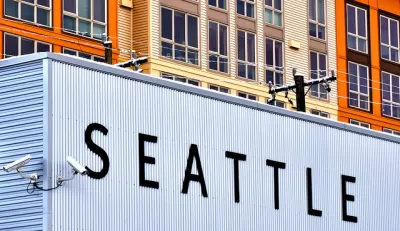Washington's House Bill 1923 is one of a number of bills under consideration this year on the West Coast that attempts to leverage the power of the state for the sake of new development.

Natalie Bicknell reports on the final details of House Bill 1923 in Washington State, which encourages cities to adopt policies that increase density.
The bill enjoyed bipartisan support from the outset, and now awaits the governor's signature, but Bicknell notes that the bill still underwent substantive changes on the way to approval. The key question up for debate is how much power the state should wield in setting minimum urban densities.
While early versions of HB 1923 included statewide mandates, from the beginning its sponsor, Representative Joe Fitzgibbon (D-34th District), sought to differentiate HB 1923 from other minimum density bills by giving local governments the option to select from a menu of options to fulfill their density requirements. Rep. Fitzgibbon hoped that by providing choices, local governments would be more receptive to the bill’s requirements.
However, it became clear to Rep. Fitzgibbon that cities were not going to get on board with a bill that included what some local government officials perceived as unfunded mandates or penalties. As a result, HB 1923 shifted from mandates to incentives, although some provisions, such as protection from appeals for developments that meet certain requirements, will take effect statewide.
Despite those changes and its bipartisan support, the Seattle Times is calling on Governor Jay Inslee to veto House Bill 1923, claiming it is designed to "[please] developers by ending the legal appeals that have slowed down 'citywide' implementation of Mandatory Housing Affordability (MHA) in Seattle."
The article includes a lot more detail about the final contents of the bill, including "menu of land use actions that cities can select from in order to qualify for up to $100,000 in planning grant assistance."
FULL STORY: Washington Legislature Opts for Incentives Over Mandates to Promote Housing Density in HB 1923

Trump Administration Could Effectively End Housing Voucher Program
Federal officials are eyeing major cuts to the Section 8 program that helps millions of low-income households pay rent.

Planetizen Federal Action Tracker
A weekly monitor of how Trump’s orders and actions are impacting planners and planning in America.

Ken Jennings Launches Transit Web Series
The Jeopardy champ wants you to ride public transit.

Rebuilding Smarter: How LA County Is Guiding Fire-Ravaged Communities Toward Resilience
Los Angeles County is leading a coordinated effort to help fire-impacted communities rebuild with resilience by providing recovery resources, promoting fire-wise design, and aligning reconstruction with broader sustainability and climate goals.

When Borders Blur: Regional Collaboration in Action
As regional challenges outgrow city boundaries, “When Borders Blur” explores how cross-jurisdictional collaboration can drive smarter, more resilient urban planning, sharing real-world lessons from thriving partnerships across North America.

Philadelphia Is Expanding its Network of Roundabouts
Roundabouts are widely shown to decrease traffic speed, reduce congestion, and improve efficiency.
Urban Design for Planners 1: Software Tools
This six-course series explores essential urban design concepts using open source software and equips planners with the tools they need to participate fully in the urban design process.
Planning for Universal Design
Learn the tools for implementing Universal Design in planning regulations.
Ada County Highway District
Clanton & Associates, Inc.
Jessamine County Fiscal Court
Institute for Housing and Urban Development Studies (IHS)
City of Grandview
Harvard GSD Executive Education
Toledo-Lucas County Plan Commissions
Salt Lake City
NYU Wagner Graduate School of Public Service




























